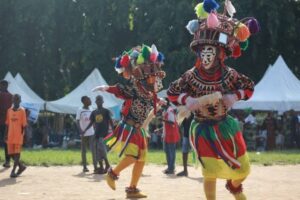Deep in the heart of Nigeria lies a vibrant cultural celebration that pays homage to the spirit of female ancestors—the Agbogho Mmuo Festival. Rooted in Igbo tradition, this masquerade festival is a colorful and captivating display of dance, music, and spirituality that honors the role of women in Igbo society. In this article, we’ll delve into the rich history, significance, and festivities of the Agbogho Mmuo Festival, offering readers a glimpse into the cultural tapestry of the Igbo people.
Origins and History:
The Agbogho Mmuo Festival traces its origins back to ancient Igbo traditions and beliefs. The festival is deeply intertwined with the Igbo worldview, which emphasizes the importance of honoring ancestors and ancestral spirits. According to legend, the festival commemorates the spirit of female ancestors who are believed to possess unique powers and wisdom.
Symbolism and Significance:
At the heart of the Agbogho Mmuo Festival is the portrayal of Agbogho, or maiden spirits, who are revered as messengers of the divine. These masked performers, adorned in elaborate costumes and intricate face paint, embody the beauty, grace, and strength of Igbo women. The festival serves as a symbolic representation of the interconnectedness between the living and the spirit world, reaffirming the importance of ancestral reverence in Igbo culture.
Also, read; Ousted Gabon President Ali Bongo Begins Hunger Strike
Festive Celebrations:
The Agbogho Mmuo Festival is a vibrant and joyous occasion marked by spirited performances, traditional rituals, and communal gatherings. Festivities typically include colorful processions through the streets, accompanied by rhythmic drumming, chanting, and dancing. The Agbogho masquerades, adorned in intricately crafted masks and costumes, mesmerize onlookers with their graceful movements and enchanting presence.
Rituals and Ceremonies:
Central to the Agbogho Mmuo Festival are a series of rituals and ceremonies that honor the spirits of female ancestors. These rituals may include libations, prayers, and offerings of food and drink to appease the spirits and seek their blessings. Participants may also engage in purification rites, cleansing themselves of negative energy and invoking the protection of ancestral forces.
Cultural Preservation and Heritage:
The Agbogho Mmuo Festival plays a vital role in preserving and promoting Igbo cultural heritage. Through its rituals, performances, and traditions, the festival serves as a powerful expression of Igbo identity and pride. It provides a platform for the transmission of cultural knowledge and values from one generation to the next, ensuring that the rich tapestry of Igbo culture continues to thrive and flourish.
Community Engagement and Unity:
Beyond its cultural significance, the Agbogho Mmuo Festival fosters a sense of community solidarity and unity among the Igbo people. It brings together individuals from diverse backgrounds and generations, forging bonds of kinship and camaraderie through shared experiences and celebrations. The festival serves as a unifying force that strengthens the social fabric of Igbo communities and reinforces their collective identity.
Conclusion:
In conclusion, the Agbogho Mmuo Festival stands as a testament to the enduring legacy of Igbo culture and tradition. With its vibrant festivities, rich symbolism, and profound spirituality, the festival offers a captivating glimpse into the cultural tapestry of the Igbo people.
As a celebration of female ancestors and the spirit of womanhood, the Agbogho Mmuo Festival serves as a powerful reminder of the importance of ancestral reverence, community solidarity, and cultural preservation in Igbo society.
